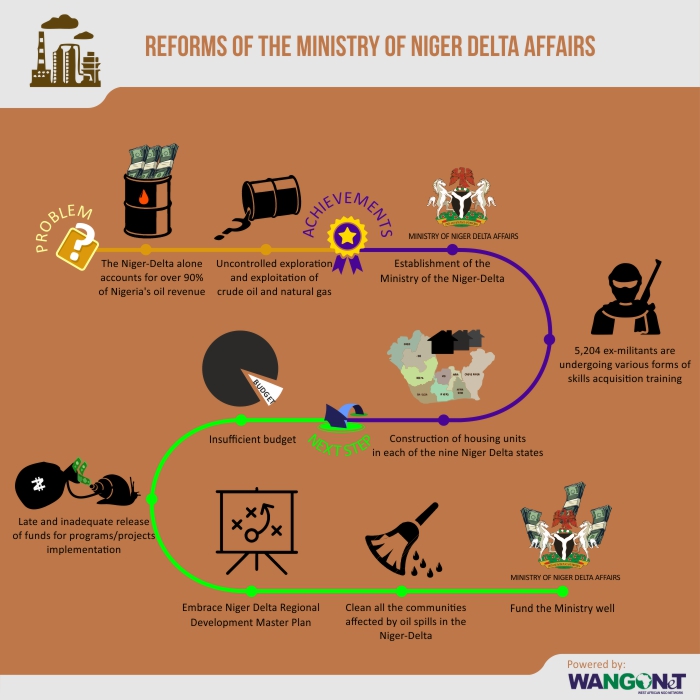Chapter 44
Reforms of the Ministry of Niger Delta Affairs
Background
Oil contributes 80% of Nigeria’s revenues, 95% of export receipts and 90% of foreign exchange, and the Niger-Delta alone accounts for almost all of Nigeria’s oil. The irony is, however, that successive governments of Nigeria did not develop the region, leaving the inhabitants to exact their livelihood in harsh conditions: In rivers polluted and farms burnt by crude oil spills. A military government was so heavy handed it executed activists led by a prominent Nigerian writer, Ken Saro-Wiwa, who are demanding for the region to be developed and its environment protected. Soon enough after the return to democracy, an armed militancy of Niger Delta youths that threatened to bring down the Nigerian state – by cutting off oil supplies and thus the source of its revenue – soon developed.
Past Reform and Achievements
The Niger Delta Development Commission (NDDC) was established in 2000 with to develop the region. The region’s significance would yet made Government to go further in 2008 and establish a Ministry of the Niger Delta Ministry, with the NDDC as its parastatal. The ministry was established to coordinate the activities of government agencies, international partners and stakeholders and fast track the region’s development. Land reclamation, shoreline protection and flood/erosion control were focused on. An amnesty programme was additionally declared for the armed militants.
These efforts ceased the militancy, and achieved relative peace and security in the region. Nigeria’s oil production which was at 700,000 bpd at the height of the militancy increased to over 2.5 million bpd—and might have stayed so were the current slumping global oil prices not be occurring. A total of 5,204 ex-militants are undergoing various forms of skills acquisition training programme or formal education (marine, heavy duty operations, welding, agriculture, boat building, oil and gas techniques, entrepreneurship, automobile technology and aviation, etc.) in Nigeria and other parts of the world.
Challenges and Next Steps
The funding of the Niger Delta development efforts should be continued, but only through processes that are corruption-proof. The key recommendations of the United Nations Environment Programme (UNEP) Report to clean Ogoniland and other communities affected by oil spills in the Niger-Delta should be implemented.


